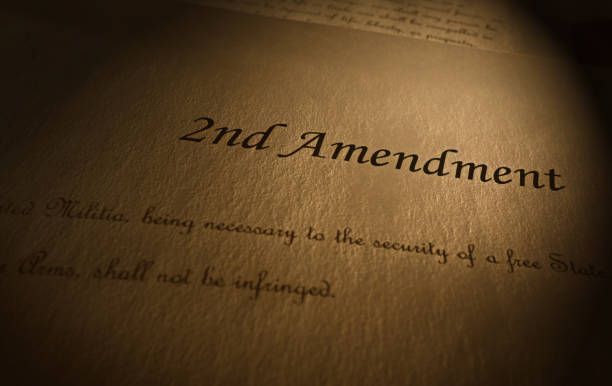Blog
Learn important information, and helpful tips about our legal system. We’ll help you navigate.

The $200 tax stamp for suppressors, short-barreled shotguns, short-barreled rifles, and “any other weapon” has been modified and the “tax stamp” now has a $0.00 cost, meaning there is no longer a cost for the applicable tax stamp required to own or possess such an item. This provision of the “One Big Beautiful Bill” will be effective as of January 1, 2026, so for the rest of 2025, the tax will still be collected for each stamp. Other items also under the jurisdiction of the NFA, such as machine guns and explosive devices, will not be affected. Even with the tax being reduced, the application and approval requirements were not changed. An ATF Form 4 application will still have to be submitted, and in certain cases, additional forms are required, to obtain the stamp through the Bureau of Alcohol Tobacco Firearms and Explosives. And yes, you still have to file separate applications for each item that qualifies as a restricted item under the NFA. Now, however, starting in January of 2026, at least you won’t have to pay for them. Items that are generally prohibited under the NFA, unless a tax stamp is obtained, have been at the center of a longstanding second amendment debate. People who are in favor of the tax and the NFA’s restrictions argue that restricting these items makes the public safer because easy to conceal firearms (like short-barreled rifles and short-barreled shotguns) can’t be easily obtained, and silencers (suppressors) that quiet gun reports, mean higher likelihood of identifying and responding to firearm-related crimes quickly. Those in favor of removing the tax stamp and tax requirements argue that such restrictions violate the Second Amendment because the NFA and its tax stamp restrictions make it harder for law-abiding citizens to bear arms by subjecting them to onerous and unnecessary additional restrictions. Others point to the fact that the NFA’s restrictions and tax imposition haven’t reduced crime and have resulted in no appreciable improvement to public safety. Citizens who want the tax to continue being implemented are arguing that it will result in a significant loss of tax revenue and that the removal of the tax will weaken gun control. Whatever side you are on, the “One Big Beautiful Bill Act” ensures that the required tax stamp will no longer cost you anything to obtain on certain specified items.

With the closure of the spring session comes numerous substantial decisions that impact citizens both on the local and national levels. Here is an overview of the most anticipated case rulings. TRUMP V. CASA SCOTUS rules to limit judges’ powers on injunctions, birthright citizenship still unclear, though the Court will take up substantive arguments about the Executive Order in the October 2025 Term. The Supreme Court ruled in favor of President Donald Trump’s argument that injunctions (a legal block) used by federal judges and implementation of national injunctions are to be limited. Justice Amy Coney Barrett’s written opinion stated that injunctions are still legal and can be used on a case-by-case basis, and only with those involved in the case. What does this mean? SCOTUS ruled that federal district courts do not have the authority to issue universal injunctions, sometimes called nationwide injunctions, that allow a Court to stop the Government from applying a specific law or set of laws against anyone. Rather, district Courts are only permitted to issue preliminary injunctions against the parties in a specific case, and only if those parties have standing, or a right to bring suit. The “Birthright Citizenship” clause of the 14th Amendment and questions about the constitutionality of President Trump’s executive order limiting its effect will be heard on the merits next term. MAHMOUD V. TAYLOR SCOTUS rules that Montgomery County, Maryland’s removal of a classroom “opt-out” during lessons involving LGBTQ+ material for children of parents whose religious beliefs do not agree or comport with such teaching or material was a violation of the First Amendment’s Freedom of Religion Clause. What does this mean? Montgomery County, Maryland’s refusal to allow parents to opt their children out of lessons in a public school that expressly taught LGBTQ+ themes or values violated the religious rights of parents, and determined that the district’s policy was a violation of the Freedom of Religion clause of the First Amendment. The Court’s decision would require public school districts across the country to permit parents to opt out of lessons or material that promotes certain LGBTQ+ themes to children, if they have a religious objection to the material or the themes being taught through the material. The Court’s ruling continues to expand the protections of the Freedom of Religion clause into the realm of public education and parental choice and control over what material a child is taught.. KENNEDY V. BRAIDWOOD The Court determined that a challenge to the mandatory provision of the Affordable Care Act requiring coverage for preventative care, i.e., vaccinations, screenings for blood pressure, cholesterol, diabetes, etc., could not be sustained, and the preventative care mandates were upheld. SCOTUS upheld the preventative care mandates contained in the Affordable Care Act, which include initial screenings and treatments such as immunizations, screenings (blood pressure, cholesterol, diabetes, etc.), and certain preventative medications. The Supreme Court’s ruling ensures that all health plans are required to offer these initial and preventive care measures. FREE SPEECH COALITION V. PAXTON A Texas law requiring age verification for websites publishing sexually explicit content deemed harmful to minors was upheld. The case was centered around Texas House Bill 1181, which necessitates age verification for websites where more than one-third of the content posted consists of material that is deemed harmful to minors. While the Free Speech Coalition argued that this burdened protected speech of adults, it was ultimately deemed reasonable in a 6-3 decision to protect minors from harmful content. FCC V. CONSUMERS’ RESEARCH Consumers’ Research, a conservative non-profit organization, challenged the constitutionality of the Universal Service Fund (USF) Program of the FCC (Federal Communications Commission). The USF provides affordable internet access to establishments such as libraries, rural healthcare providers, and schools, and is funded by donations from communications carriers. Consumers’ Research argued that the way USF funds are allocated is unconstitutional. Ultimately, the Supreme Court was in favor of the FCC and supported the constitutionality of how it is funded.

Michigan Senate Bill 224 imposes this statewide law with a felony charge punishable by a five-year sentence and/or a $2,500 fine for violators. Although the wording of the bill does not outright say that the “bump stock is banned”, the restrictions the bill imposes make it impossible to legally own, purchase, or transfer a bump stock. Michigan Senate Bill 224 imposes this statewide law with a felony charge punishable by a five-year sentence and/or a $2,500 fine for violators. Although the wording of the bill does not outright say that the “bump stock is banned”, the restrictions the bill imposes make it impossible to legally own, purchase, or transfer a bump stock. The bill effectively creates this ban by requiring law-abiding Michigan residents to obtain a U.S. Federal Treasury Tax Stamp before purchasing a bump stock. To purchase certain items contained in the NFA (National Firearms Act), Federal Law requires a purchaser to obtain a tax stamp before purchasing any Class 3 item. Some examples of Class III items are short-barrelled shotguns, silencers or mufflers, fully automatic weapons (machine-guns) and heavy explosive devices. Prior to October of 2024, bump stocks were considered NFA Class III items based upon the administrative determination of the Bureau of Alcohol Tobacco Firearms and Explosive (BATFE or ATF). However, a recent United States Supreme Court Opinion ruled that the ATF’s administrative determination to add bump stocks to the NFA’s classification as a Class 3 item is a violation of the Second Amendment. Garland v. Cargill , 602 U.S. 406, 144 S. Ct. 1613, 219 L. Ed. 2d 151 (2024) struck down the unilateral administrative Class 3 classification of the bump stock, meaning they are no longer included in the NFA’s Class 3 Items List. As such, you cannot obtain a Federal US Treasury Stamp for a bump stock. Since Michigan’s new Senate Bill 224 requires a Tax Stamp to legally own a bump stock, Michigan residents are effectively barred from obtaining them, and if they have one and do not have a previously obtained U.S. Treasury Stamp, may have to remove and destroy them, or be at risk of law enforcement action. Michigan’s legislature is seemingly ignoring the United States Supreme Court’s ruling in Cargill , and is busily pushing through bills that further infringe on the Second Amendment rights of law-abiding Michigan residents.

Today, May 23, 2023, the United States Court of Appeals for the Fifth Circuit, issued an unpublished order granting a preliminary injunction in the case of Mock v. Garland, Case No. 23-10319 regarding the Bureau of Alcohol, Tobacco, Firearms and Explosives’ (BATFE) Final Rule 2021R-08F. The rule, signed by the Attorney General on January 13, 2023, made it illegal to possess an AR-15 style or AK-47 style pistol equipped with a “stabilizing brace.” The rule reclassified these firearms from their previous category as a “pistol” and instead classifies them as “short-barreled rifles.” The change was significant, because firearms classified as pistols may be possessed and purchased by any person who is not specifically excluded from owning a firearm under State or Federal law, so long as it is registered with the appropriate licensing authority. A short-barreled rife is a prohibited article under the National Firearms Act, unless the person who owns it, or desires to purchase it, procures a tax stamp after submitting a Form 4 application. Millions of people who own these types of firearms legally were required to either permanently remove the brace, which makes these types of weapons difficult to use and operate, particularly for disabled veterans and individuals, or they had to sell them to an appropriately licensed dealer or turn them in to law enforcement or destroy them. While the injunction by the Fifth Circuit was limited in scope to the Plaintiff’s who filed the lawsuit, the ruling signals that the Court is likely to overturn the rule. Under the present rule, the possession of a braced pistol is a felony punishable by significant prison time, if convicted. The rule was not approved by Congress or through an amendment to the National Firearms Act, but was created by BATFE fiat and approval of the Attorney General. The Fifth Circuit will have to determine if an administrative agency, without Congressional approval, can promulgate regulations that criminalize previously lawful behavior, without direction or oversight from Congress. The limited temporary injunction signals the Court may overturn Rule 2021R-08F and again allow for the purchase of braced pistols without the need for NFA Tax Stamp application and exemption.

Blog: Michigan Legislature Proposes New Open and Concealed Carry Restrictions By: Daniel J. Williams, Esq. On February 28, 2023, members of the Michigan House of Representatives members Neeley, Brixie, Young, Tsernoglou, Hood, Paiz, Morse, Steckloff, Martus, McKinney, Wilson, Rogers, MacDonell, Dievendorf, Rheingans, Glanville, Price, Pohutsky, Byrnes, Arbit, Brabec, Hope, Morgan, Puri, Scott, Weiss, Stone, Mentzer, Koleszar, Edwards, Grant, Coffia, B. Carter, O’Neal, T. Carter, Hoskins, Breen, Miller, Whitsett, Farhat, McFall and Aiyash, submitted House Bill 4150 to the Committee on Judiciary for review. House Bill 4150 proposes amendments to M.C.L. §750.234d that would impose more stringent restrictions on where firearms may be open carried, and also proposes to override the right of persons who possess valid concealed pistol licenses (CPLs) to carry in some places that are presently permitted. Specifically, the bill proposes that firearms may not be possessed for any reason, by any person in Michigan at the following locations: “depository financial institution or a subsidiary or affiliate (banks), churches, Court, theatre, sports arena, day care center, hospital, any establishment licensed under the Michigan Liquor Control Code, and a building or part of a building that is owned or leased by the State of Michigan. The proposal would eliminate section 2, paragraph (3), which currently provides that “(2) This section does not apply to any of the following: … (c) A person licensed by this state or another state to carry a concealed weapon.” Presently, CPL holders in Michigan are less restricted in where and when they can carry than what is proposed by this new legislation. Persons who hold a concealed pistol license in Michigan should pay close attention to this proposed Bill as it travels to committee review. Otherwise, if the bill passes, and you aren’t aware of the new restrictions, you could find yourself with a misdemeanor or even a felony charge, despite the fact that you might be compliant with the law as it stands today. Firearms laws are changing rapidly in Michigan, and there are more proposals coming. Keep checking in here for more updates as we will do our best to keep you informed. And as always, if you find yourself on the wrong side of any of these firearms law, whether old or just recently passed, give us a call.

Case Update: Provider Actions Not Barred Because An Insurer Rescinds Claimant’s Policy Aimee M. Fowler, Esq. On April 6, 2023, the Court of Appeals issued its opinion in C-Spine Orthopedics, PLLC v. Progressive Michigan Ins. Co. and LM General Ins. Co, COA #359681, resulting in a major win for medical providers treating auto accident patients. The Court determined that when a provider files a lawsuit, before the underlying claimant files his or her action, a determination by the automobile insurer to rescind the underlying claimant’s policy, does not automatically preclude recovery by the provider in its separate action. Following its developing line of cases, the Court determined that the legal doctrine of res judicata, which bars the same civil matter from being filed twice where it has been previously resolved, does not bar a properly filed provider suit based upon an assignment. The Court has held that the assignment of rights by an auto accident claimant causes them to lose privity in interest, meaning they no longer share the same legal interest. As such, the legal doctrines of res judicata and collateral estoppel cannot bar or result in a dismissal of a provider’s claim on these grounds, if they have properly filed separate suit based upon an assignment of rights. Under those circumstances, even if the insurer rescinded the claimant’s policy during the course of litigation and obtained a judgment, the provider’s claim is not defeated on grounds of res judicata or collateral estoppel. This does not mean other challenges couldn’t result in defeat of the provider’s claim, but these avenues are no longer available to insurance defendants to attempt to dispose of a claim. Providers are having to navigate seemingly choppier waters in the No-Fault space each passing day. Our office specializes in working with providers to find refuge from these stormy times in the No-Fault act by providing advanced strategies to improve the speed and values of outcomes, even where the Medicare Fee Schedule may apply all or a portion of a provider’s bills. If you are a provider looking for guidance, please contact our office to see if we can help you.

Senate Bill 83, which has now passed the Michigan House and is set for vote in the Michigan Senate, is commonly known as the “Extreme Risk Protection Order Act.” Such Extreme Risk Protection Order laws, commonly referred to in the news as “Red Flag Laws,” have become quite the rage in State legislatures. Many legislators view these types of laws a “common-sense gun control” measures to help tamp down acts of gun violence. However, each state’s version of these laws is different. Some are more restrictive, some less so. All of them trigger Second and Fifth Amendment concerns, as they provide a means by which the Government can issue orders to take a person’s property, here their firearms, by means of a Court order, effectuated by local police departments or other law enforcement agencies. What Does the Law Do? “Red Flag Laws,” or Extreme Risk Protection Order laws are, at least in theory, designed to do two things, both of which seem common sense on their surface. First, they are supposedly designed to keep person’s who, for a variety of reasons, pose a risk to his or her own safety, or the safety of another person, from purchasing or obtaining a firearm. Second, they are supposedly designed to remove a firearm or firearms from a person who is deemed to be a threat to him or herself or others. While these seem like commendable goals, such orders pose clear and present danger of abuse and, in some circumstances, can infringe on a person’s Second Amendment right to keep and bear arms, and their Fifth Amendment rights against unlawful taking of property by the Government. Michigan’s proposed Extreme Risk Protection Order Act would be one of the most stringent in the country. The law permits a spouse, former spouse (i.e. an ex-husband or ex-wife), significant other, former significant other (ex-boyfriend or ex-girlfriend), parent, sibling, cousin, uncle, aunt, nephew, niece, other more obscure family member, mother or father or a child in common (baby momma or baby daddy to be colloquial), any police officer, or a health care provider (doctor, nurse, psychologist etc.) may file a complaint and summons with the family court for an appropriate county, seeking an order to restrain the target of the complaint from purchasing or possessing a firearm. A court that receives such a complaint must expedite consideration of such orders. Generally, the Court is supposed to provide a respondent (the person who is supposedly in need of an injunction against buying, owning, or possessing a firearm) notice. Notice and an opportunity to be heard are fundamental tenets of due process, which is required before a Court or the Government are generally able to infringe on a constitutionally protected right. The proposed statute provides that where notice is provided to the respondent, only “a preponderance of the evidence” is required to enter such an order and permit confiscation of not only a firearm owned by the respondent, but even of firearms not owned by the respondent, but which he or she might have access to. In other words, Michigan’s law permits the taking of property from a person who is not even the target of an extreme risk protection order, simply because the respondent might gain access or possess those firearms. The law permits the Court to enter such an order even when the respondent has no notice and no opportunity to be heard. The proposed statutes provides that, where a Court has clear and convincing evidence, it may enter such an order, and allow the respondent an opportunity to seek a hearing later. Generally, clear and convincing evidence is the standard required for a Court to enter such an order, after a hearing and an opportunity for both sides to present witnesses. Michigan’s Red Flag Law permits the Court to enter such an order without a full hearing or an opportunity for the respondent to be heard. What About Your Rights Under the Second and Fifth Amendment The Second Amendment provides that the right of the people to keep and bear arms shall not be infringed. The U.S. Supreme Court has held that this right is a fundamental right and that it is incorporated to the States, meaning, individual States can’t pass laws that infringe upon this right unless they are necessary to fulfill an important government interest. Necessary means that there is no less restrictive means by which the State could accomplish the same important interest than the means prescribed by the questioned law. The Fifth Amendment provides that the Government cannot take a persons property without due process. Due process, in its simplest terms, means that both sides have to be provided notice of a hearing AND an opportunity to have their side heard before a Court can take action. Michigan’s Extreme Risk Protection Order Law appears problematic under both considerations. The law not only provides a pathway for takings where a respondent is not permitted notice or a hearing before the order is entered, it permits the Court to issue anticipatory search warrants for confiscation purposes and permits the seizure of firearms that are not even owned by the respondent, but to which he or she might have access (constructive possession). In other words, the law would permit the taking of a person’s property who is not the subject of the Extreme Risk Protection Order, who is lawfully and responsibly owning their firearm, because, for example, their significant other’s ex-spouse files an emergency complaint with allegations that a Court believes. All without the respondent, or the third person whose property is confiscated having an opportunity to be heard. The law also does not require that the Government must return the firearms to the respondent or the third party if the allegations are found to be insufficient. The bill has not been signed into law, though it has been adopted by both the Michigan House and Senate. However, signals are pointing strongly to the likelihood that this bill will find its way to the Governor’s desk and into law before the end of the year. The bill was sent to the Governor for signature on May 9, 2023 and all signs point to its passage. If this law goes into effect, and you become the respondent in one of these actions, give our office a call. We stand ready to defend clients against these actions, and to challenge the constitutionality of this law’s application.

On March 8, 2023, House Bill 4211 was put forth for review and consideration by Democratic Representatives Hood, Hope, Brabec, Tsernoglou, Rheingans, Paiz, Price, Carter, Grant, Puri, Scott, Morse, MacDonell, Byrnes, Miller, Brixie, Young, Arbit and Aiyash. The bill proposes to amend M.C.L. §750.223, specifically section 5, to add the following language: “(5) A seller of a firearm shall not deliver the firearm to the purchaser of that firearm until at least 14 days after the date the sale of the firearm is completed. A person that violates this subsection is guilty of a misdemeanor punishable by imprisonment for not more than 90 days or a fine of not more than $2,500.00, or both.” The law would make it a misdemeanor for any person, either an FFL dealer or participants in a private sale (i.e. guns shows or person-to-person), cannot deliver the weapon to the purchaser until after the passage of fourteen (14) days after the completion of the sale. Violating the statute constitutes a misdemeanor with up to ninety (90) days in jail. The provision would be the toughest in the nation, particularly with regard to bolt action rifles and modern sporting rifles. Other states do have waiting periods, but only Hawaii’s would be equal to that in Michigan. As other examples, California, District of Columbia, and the State of Washington have a ten (10) day waiting period. Maryland, Minnesota, New Jersey and Rhode Island have seven (7) day waiting periods. Illinois and Florida currently have three (3) day waiting periods, though in Florida, the waiting period is waived if the purchaser is approved and licensed to carry a concealed pistol. The bill is only in the early stages of review but given the stated determination of House and Senate Democrats, as well as the governor, this is a law that should be watched for potential passage. From a legal standpoint, the question such a restriction warrants is whether or not such limitations are constitutionally permitted and if the proposed restriction is necessary to protect an important government interest to the extent that no lesser or more appropriate restriction could have the same effect, but with less restrictions on individual liberties. Keep checking in for more updates on this and other legal issues that could impact your rights.
For more information on the variety of case types we cover, call: 313-458-8276
